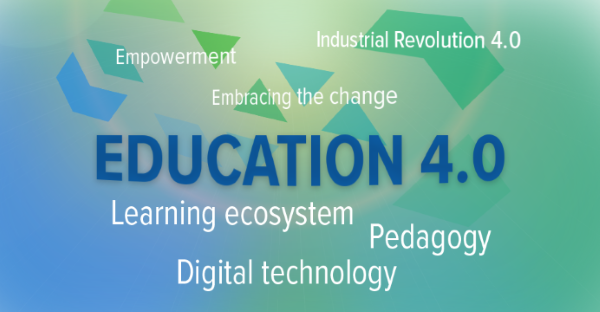News
EMVITET project developing Education 4.0 in Vietnam

Rethinking Learning Towards Education 4.0 (Part 1)
Rapid changes and disruption in the world of work invite all of us to rethink learning and education. Industrial Revolution 4.0 or Industry 4.0 known as digital age with big data, artificial intelligence and internet of things has great impacts on many sectors and leads to new terms such as Education 4.0 (e.g. Iyer, 2018; Saxena & Bhat, 2017; Schwab, 2016).
Education 4.0 shifts mindsets and approaches in learning and teaching. Digitalisation enables learning to occur anywhere which makes learners key actors of their own learning. Teachers change their role to facilitators of learning. Instead of focusing so much on degrees, learning concentrates on relevant competences. Education 4.0 refers also to ecosystems of educational institutions and the world of work, which produce innovations and evolve in the change. It means that in education we do not just adapt to changes, but we actively build our own meaningful future. In Education 4.0, the traditional ways of implementing education are not enough, but we need to rethink learning and education to match the needs of the changing world. The challenge is global, but in rapidly developing countries, such as in Vietnam, it might be even stronger. In this article, we want to discuss our first perceptions of developing Education 4.0. in Asian-European collaboration.
The EMVITET project developing Education 4.0 in Vietnam
The EMVITET (Empowering Vietnamese VET teachers for transformation towards Education 4.0) Erasmus+ capacity building project will create a new learning ecosystem for Education 4.0 in Vietnam, based on student-centred learning, competence-based education, collaboration and networking in digital environments, and sharing knowledge through a community of practice.
Häme University of Applied Sciences (HAMK) with strong expertise in developing education and Ho Chi Minh City University of Technology and Education (HCMUTE) as a leading university in Vietnam prepared the EMVITET project in collaboration with two other Vietnamese universities: UD-UTE (University of Danang, University of Technology and Education) and LHU (Lac Hong University), and with three Vietnamese colleges: Hue Industrial College (HueIC), College of Technology II (HVCT) and Ho Chi Minh City Industry and Trade College (HITC). Two European universities, KU Leuven from Belgium and Dublin City University (DCU) from Ireland, were invited to join because of their specific expertise. The project received funding for a three-year development process (2019–2021) from the European Union.
The process of the project is described in figure 1. The implementation of EMVITET is based on participatory action research approach (Kemmis & McTaggart, 2005) emphasizing transformation cycles, called work packages (WP) in the project, in which all participants’ involvement is crucial. The aim of WP 1 Preparation was to build a common understanding between partners and sustainable ground for developing education in the Vietnamese context. During the forthcoming development cycles WP 2.1. Establishing, WP 2.2. Piloting and WP 2.3. Ingraining, five teacher developers from each Vietnamese institutions will learn and develop new educational practices. In each cycle or WP, Vietnamese participants are engaged in analysing their development needs in individual and community level and tailoring the forthcoming activities. The practitioners’ own perspectives are highly valued and utilized following a practitioner research approach (Heikkinen, de Jong, & Vanderlinde, 2016).

This article describes the outcomes of WP 1 Preparation. During WP 1, we have had many online meetings, face-to-face kick-off meeting and managers’ study visit to Finland exploring Education 4.0 in practice. Furthermore, in this article we use the following data: 1) pre-questionnaires about the starting point from all Vietnamese partners, 2) collaborative analysis from kick-off meeting and 3) the managers’ study visit outcomes (digitally documented in Padlet). Even though the participating educational institutions are different from each other, some general aspects can be identified in teacher, student, organizational and ecosystem level. The authors of this article have been personally involved in the activities, so their viewpoints are also utilized.
EMVITET, Education 4.0


